The Nichirei Group is working to build a sustainable supply chain. On April 1, 2022, the Group established the Nichirei Group Human Rights Policy, the Nichirei Group Sustainable Procurement Policy, the Nichirei Group Supplier Code of Conduct, and the Nichirei Group Supplier Guidelines. These polices are based on the United Nations Guiding Principles on Business and Human Rights and the Ten Principles of the United Nations Global Compact as well as on The Nichirei Pledge, which is the Group’s basic sustainability policy. They also provide the foundation for “realizing sustainable food procurement and resource recycling,” one of the Group’s material matters. Going forward, we will continue to promote the Nichirei Group Supplier Code of Conduct and Guidelines. We will evaluate risk factors in the supply chain and work with suppliers to mitigate these risks in accordance with the potential impact on business.
We will work to build a sustainable supply chain by sharing values and building close relationships within the Group and with suppliers.
| Policy | Key Points for Amendment and Enactment |
|---|---|
| Nichirei Group Human Rights Policy | Respect for human rights in the Group and throughout the supply chain, implementation of human rights due diligence, introduction of system for filing grievances, etc. |
| Nichirei Group Sustainable Procurement Policy | Respect for human rights throughout the supply chain, reduction of environmental impact, consideration for animal welfare and biodiversity, etc. |
| Nichirei Group Supplier Code of Conduct | Clarification of requirements for suppliers based on the Nichirei Group Sustainable Procurement Policy |
| Nichirei Group Supplier Guidelines | Explanation of items in the Nichirei Group Supplier Code of Conduct |
For the Nichirei Group, which is involved in the entire supply chain from procurement of materials to production, sales, distribution, processing and logistics, realizing sustainable procurement is one of crucial topics for management, and the Director, Senior Executive Officer is in charge of it.
It is set as one of our Materiality, and progress is reported and discussed at the Group Sustainability Committee, an advisory body to the Board of Directors. We are working toward KPIs we set for each of the five Group material matters. The Group Sustainability Committee monitors overall measures, while specific measures are incorporated into the action plans of each division, operating company, and committee. Connecting Group targets with those of each operating company directly links the achievement of each company’s business plan to improvement of the Nichirei Group’s social and economic value.
Furthermore, to facilitate more detailed information sharing and discussions on various issues related to building a sustainable supply chain among group companies, we have established the "Group Supply Chain Managers' Meeting" starting in fiscal year 2025. This initiative aims to promote highly effective activities across the entire Nichirei Group.
●Sustainability Promotion Structure

The Nichirei Group is promoting sustainability initiatives in its supply chain, which is the foundation of its business. With reference to the OECD’s Due Diligence Guidance for Responsible Business Conduct, we recognize that our business activities could potentially have a negative impact on workers, human rights, the environment, bribery, consumers and corporate governance. We therefore take action to avoid and address potential negative impacts associated with our business, our supply chain and other business relationships.
The Nichirei Group supports the No Deforestation, No Peat and No Exploitation (NDPE) commitments and partners with its suppliers to procure palm oil in a responsible manner. To do so, in April 2023 we established the Nichirei Group Sustainable Palm Oil Procurement Guidelines and formulated new Group material matter targets and associated KPIs.
In August 2018, the Group became a member of the non-profit organization Roundtable on Sustainable Palm Oil (RSPO), which promotes the production and use of sustainable palm oil. We are advancing efforts to ensure that the palm oil used to make our products is from sustainable sources. Since 2018, Nichirei Foods’ factories (at consolidated subsidiaries in Japan and overseas) that use palm oil have been purchasing RSPO certified sustainable palm oil credits (via the book and claim method) corresponding to 100% of the palm oil they use.
We are making progress toward achieving a procurement rate for RSPO certified sustainable palm oil of 100% by 2030.
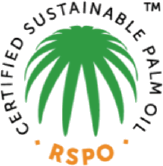
Membership profile page
Marine products are fundamental resources in the Nichirei Group’s business. Problems identified in recent years include climate change, the impact on ecosystems from overfishing and bycatch, habitat destruction including deforestation for aquaculture, and fishery worker human rights violations. In April 2023, we established the Nichirei Group Sustainable Marine Product Procurement Guidelines to resolve issues related to sustainable marine products in the supply chain, with the aim of realizing a sustainable society in cooperation with suppliers and stakeholders. Concurrently, we established new KPIs for Group materiality goals.
Since 2006, Nichirei Fresh Inc. has been involved in the "Inochi-no-Mori-Project"*1, a natural environment protection activity on Kalimantan Island, Indonesia, through the sustainable black tiger prawn farming and mangrove tree planting. The company has also spread its activities to banamei shrimp aquaculture ponds in Sumatra, Indonesia, and obtained ASC certification*2 in 2018. 280,000 mangrove trees have been planted since 2020. We are also gradually increasing our handling of Marine Stewardship Council (MSC) certification*3 marine products, and As of June 2024, we are handling 26 species of marine products. We will continue to increase our handling of sustainable marine products.
| Certification | MSC/ASC Certification |
|---|---|
| MSC Certification Number MSC-C-52165 |
Chinook salmon, Chum salmon, Coho-silver salmon, Pink salmon, Sockeye-red salmon, Pacific cod, Northern rock sole, Yellowfin sole, Flathead sole, Walleye pollock, Arrowtooth flounder , Kamchatka flounder, Yesso scallop, Capelin, Snow crab, Herring, Arctic surf clam, Red king crab, Longfin squid, Pacific cupped oyster, Japanese carpet shell, Pacific ocean perch, Atka mackerel, Greenland halibut, Albacore tuna, and Skipjack tuna |
| ASC Certification Number ASC-C-01632 |
Giant tiger prawn, Whiteleg shrimp, Pacific cupped oyster, Atlantic salmon, Coho-silver salomon, and Rainbow trout |
(As of June 2024)
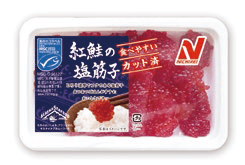 Shio Sujiko (salted sujiko),
Shio Sujiko (salted sujiko),We have launched activities at Group company cafeterias, venues where employees regularly gather to eat, to raise awareness of the importance of making sure that sustainable sources of food are available to the next generation.Nichirei Fresh has obtained CoC certification* and the company cafeteria menu at its head office offered the ASC-certified shrimp and MSC-certified Japanese carpet shell it procures and sells.
In FY2024, we have implemented this intiative at employee cafeterias in the Kanto region, including the Company's Head Office cafeteria in Tokyo. We also intend to extend this intiative, putting the MSC-certified products and ASC-certified products on the menus, to other our cafeterias.
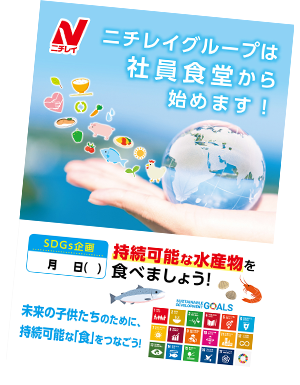
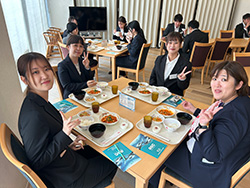
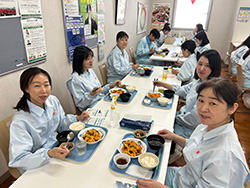
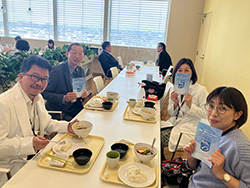
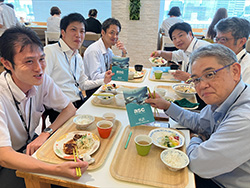
| Product Name | Date | Venue | Menu | Image Photo | |
|---|---|---|---|---|---|
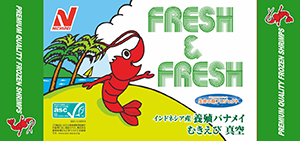 Vannamei Shrimp |
1st | July 3, 2023 | Nichirei Higashi-Ginza Building(Head Office: Tokyo) | ASC-certified shrimp and garlic curry | 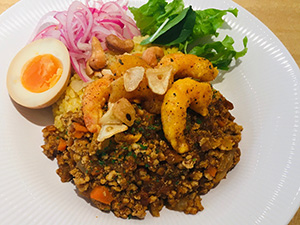 |
| 2nd | September 11, 2023 | ASC-certified shrimp stir fry | 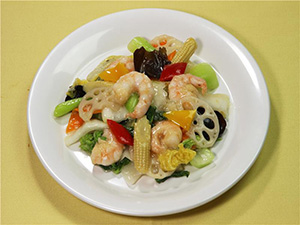 |
||
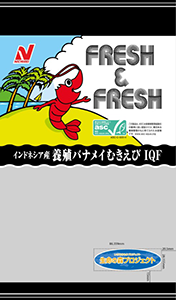 Vannamei Shrimp |
3rd | September 27, 2023 | Nichirei Tenma-bashi Building(Osaka) | ・ASC-certified shrimp curry ・Shrimp and avocado salad |
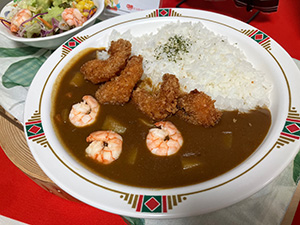 |
| 5th | October 19, 2023 | Nichirei Training Center(Tokyo) | Chili sauce with ASC-certified shrimp and egg | 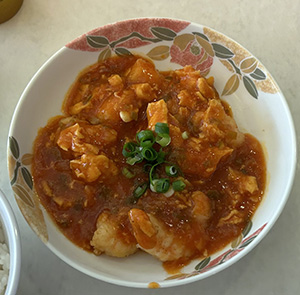 |
|
| 6th | November 2, 2023 | Nichirei Group Technology Development Center(Chiba) | |||
| 11th | April 9, 2024 | Nichirei Training Center | Cream pasta with ASC-certified shrimp and asparagus | 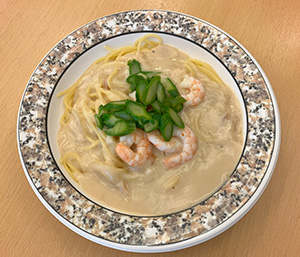 |
|
| 14th | April 18, 2024 | Nichirei Group Technology Development Center | Udon/Soba noodles with mixed ASC-certified shrimp tempura | 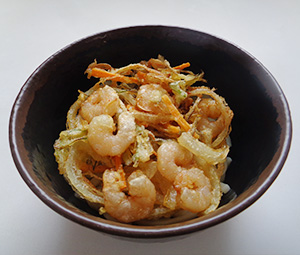 |
|
| 15th | May 13, 2024 | Nichirei Tenma-bashi Building Kansai Plant, Nichirei Foods Inc. Nichirei Logistics Kansai Inc. |
ASC-certified shrimp champon | 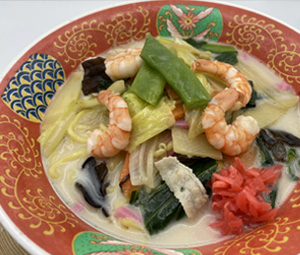 |
|
| 16th | May 21, 2024 | Kyurei(Fukuoka) | ASC-certified shrimp doria | 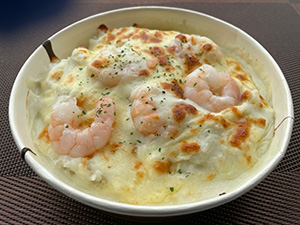 |
|
| 17th | May 24, 2024 May 30, 2024 |
Daikoku DC, Kyokurei Inc. Honmoku DC, Kyokurei Inc. |
Rice bowl with ASC-certified shrimp and vegetable tempura | 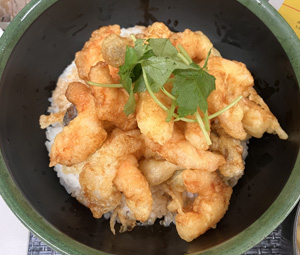 |
|
| 20th | June 19, 2024 June 20, 2024 June 21, 2024 |
Sendai DC, Nichirei Logistics Tohoku Inc. Sendai XD, Logistics Network Inc. Shiroishi Plant, Nichirei Foods Inc. |
Tomato cream pasta with ASC-certified shrimp and spinach | 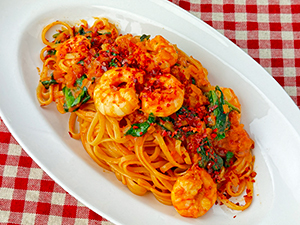 |
|
| 21th | June 25, 2024 June 26, 2024 June 28, 2024 |
Churei(Yamaguchi) Mori Plant, Nichirei Foods Inc. Funabashi No.2 Plant, Nichirei Foods Inc. |
Fried ASC-certified shrimp and fava bean with mayonnaise sauce | 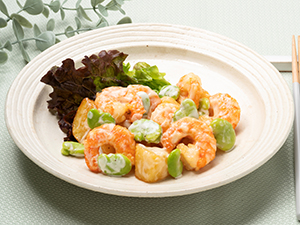 |
|
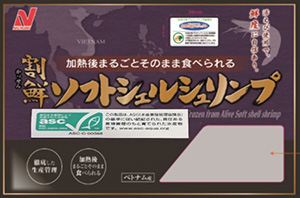 Vannamei Shrimp |
4th | October 13, 2023 | Global Innovation Center(Saitama), Nichirei Biosciences Inc. |
ASC-certified whole fried shrimp and hamburg steak | 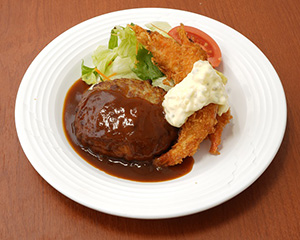 |
| 9th | January 10-12, 2024 | Funabashi Plant, Nichirei Foods Inc. Funabashi No.3 Plant, Nichirei Foods Inc. Funabashi DC, Logistics Network Inc. |
|||
| 12th | April 11, 2024 | Global Innovation Center | Rice bowl with ASC-certified whole shrimp tempura | 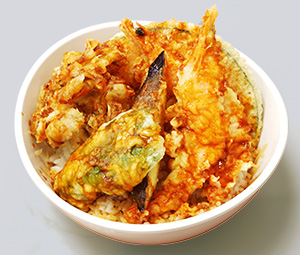 |
|
| 13th | April 17-19, 2024 | Funabashi Plant, Nichirei Foods Inc. Funabashi No.3 Plant, Nichirei Foods Inc. Funabashi DC, Logistics Network Inc. |
|||
| 18th | May 28, 2024 | Nichirei Higashi-Ginza Building | ASC-certified soft shrimp burger | 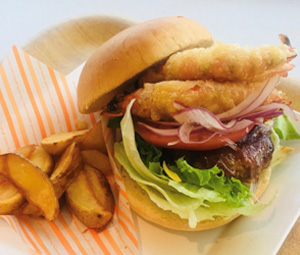 |
|
| 19th | June 12, 2024 | Funabashi Plant, Nichirei Foods Inc. Funabashi No.3 Plant, Nichirei Foods Inc. Funabashi DC, Logistics Network Inc. Global Innovation Center |
Salt ramen noodles with ASC-certified whole grilled shrimp |  |
|
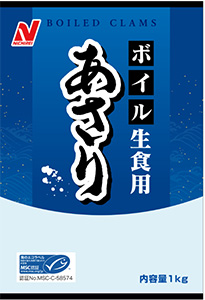 Short Necked Clam |
7th | December 1, 2023 (Anniversary of the founding) |
1)Nichirei Higashi-Ginza Building 2)Global Innovation Center 3)Nichirei Tenma-bashi Building 4)Nichirei Group Technology Development Center |
・MSC-certified Japanese carpet shell and yakuzen curry1 ・MSC-certified Japanese carpet shell soup curry2,6 ・MSC-certified Japanese carpet shell and vegetable curry3,4,5 |
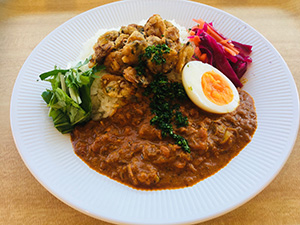 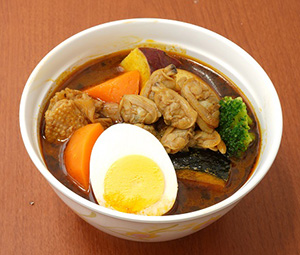 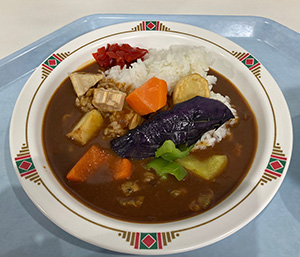 |
| 8th | December 8, 2023 | 5)Nichirei Training Center(Tokyo) | |||
| 10th | March 25-27, 2024 | 6)Funabashi Plant, Nichirei Foods Inc. Funabashi No.3 Plant, Nichirei Foods Inc. Funabashi DC, Logistics Network Inc. |
In the province of North Kalimantan, on the Indonesian island of Borneo, the natural environment is facing destruction from the expansion of plantations, afforestation, and shrimp farming. The rapid increase in the number of shrimp farms in coastal areas has led to the successive felling of forests and mangroves, and the rapid environmental changes are threatening valuable wildlife species with extinction.
In 2006, responding to concerns over the loss of mangroves in North Kalimantan, Nichirei Fresh initiated the Inochi-no-Mori-Project in cooperation with its local supplier, PT. Mustika Minanusa Aurora (MMA) and the city of Tarakan, on Tarakan Island. The project assists in planting efforts and biodiversity conservation, by selling shrimp cultivated traditionally without using formula feed or electricity, and donating a portion of the proceeds to MMA’s Mangrove Foundation. In partnership with WWF Indonesia and WWF Japan until June 2019, Nichirei Fresh also had promoted aquaculture improvement and forest conservation activities as part of the WWF North Kalimantan Sea and Forest Conservation Project. Over a 10-year period, trees have been planted across an area stretching 302 hectares in an effort to restore mangrove forests. This has resulted in an increase in wildlife, including small birds, crabs and small fish, and even proboscis monkeys introduced from outside the region have begun breeding naturally.
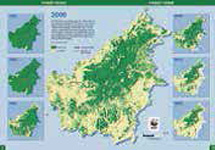 About half of the island’s forest has
About half of the island’s forest has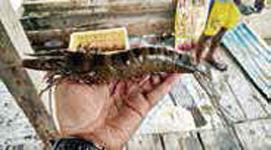 Shrimp that have grown big
Shrimp that have grown big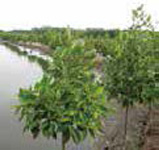 Regeneration of mangrove trees
Regeneration of mangrove trees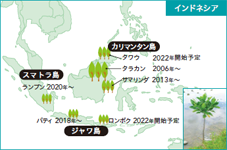 Mangrove Planting
Mangrove PlantingIn June 2022, Nichirei Fresh joined Fukuoka Uoichiba Co., Ltd. and the Amakusa Fisheries Cooperative in launching the Inochi-no-Umi-Project. This initiative focuses on regenerating Zostera beds, which are areas of the seabed where this type of marine eelgrass grows. The project is funded using a portion of sales of natural shiba shrimp caught in Amakusa City, Kumamoto Prefecture. Zostera beds are a spawning and nursery ground for marine life. They play an important role in the marine ecosystem. However, Zostera beds are declining in number each year, which impacts the habitat of marine life and causes water quality to deteriorate.
Nichirei Fresh will use the expertise and experience it has gained overseas to protect ecosystems in Japan that support seafood and the marine environment, and engage in sustainable procurement of marine products.
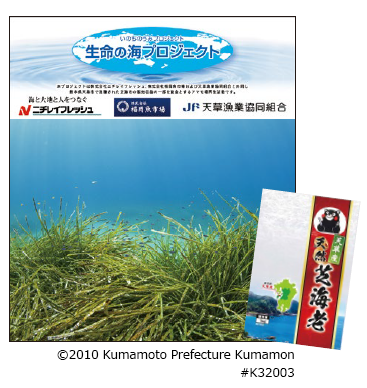
Nichirei Foods has begun making ongoing donations through Provefrut S.A. for local community support activities carried out by local NPOs. Headquartered in Ecuador, Provefrut packs locally produced frozen broccoli. As a new approach to supporting Provefrut and the local community, we donate ¥1 to a local NPO via Provefrut for every bag of ready-to-cook, highland-grown broccoli sold. Through this initiative, we are contributing to local communities by sustainably procuring frozen broccoli from Ecuador.
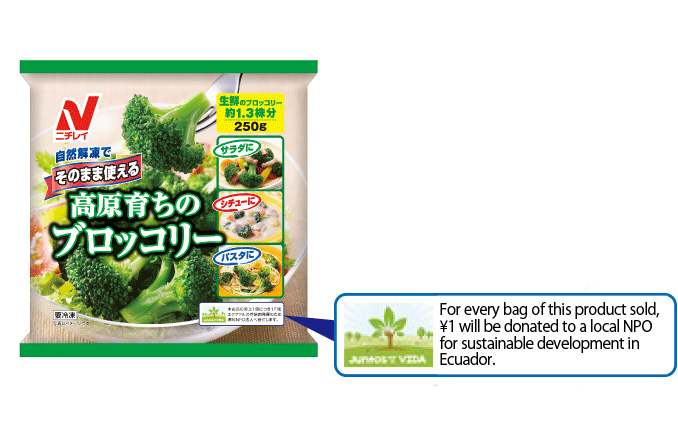
In 2009, Nichirei Fresh launched a feed rice project in collaboration with the Japan Agricultural Cooperative in Iwate Prefecture and farmers from Karumai and Hirono in 2009, and in the 13 years since then the project has been implementing a sustainable regional agricultural and livestock cycle through the production of the Junwakei breed of chicken (a crossbreed of two native Japanese species). When the project was first launched, paddies for feed rice covered around 15 hectares. By FY2022, this area had expanded to around 249 hectares yielding a harvest of roughly 1,700 tons.
Manure from the poultry farm is made into organic fertilizer at an on-site high-speed manure processing plant.
This fertilizer is spread over the feed rice paddies that were previously fallow rice fields, providing nutrients for the soil. Rice harvested from these paddies is fed to Junwakei chickens as formula feed. Moreover, waste heat energy from the manure processing plant is used to heat the chicken coops.
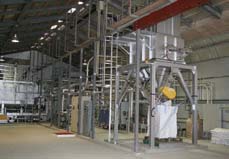
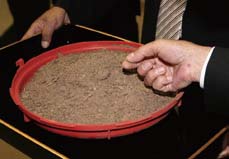
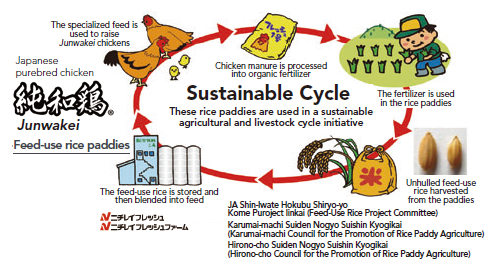
Chemical agents, such as antibiotics and synthetic antibacterials, are used in general broiler chicken farming to treat diseases, prevent the spread of illnesses due to farming conducted in tight spaces, and promote growth.
Nichirei Fresh has been selling antibiotic-free chicken since 2004. While vaccinated, our poultry is not exposed to chemical agents, including antibiotics and synthetic antibacterials, that could contribute to the emergence of antibiotic-resistant bacteria.* Instead, our poultry farming methods take full advantage of the innate immunocompetence of chickens.
Our farming technology takes into consideration the growing conditions and applies Nichirei Fresh’s proprietary expertise to poultry farming, resulting in chickens with higher natural immunocompetence and greater natural resistance to diseases. This is achieved through the use of such feed ingredients as lactic acid, other probiotics, and plant-based herbal medicines that help maintain the health of chickens and boost their immunity. Since the manure of chickens exposed to antibiotics affects soil bacteria and groundwater, the poultry farming methods used to produce antibiotic-free chicken also contribute to the natural cycles intrinsic to ecosystems.
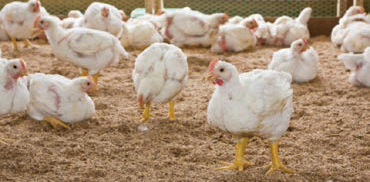
●Antibiotic‐resistant Bacteria That Threaten Ecosystem Cycles
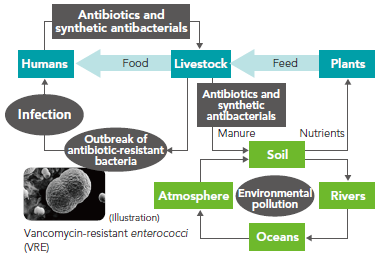
Nichirei Fresh is performing its own inspections to ensure that poultry is antibiotic free. These inspections roughly break down into verification of production processes and product inspections.
Personnel responsible for the inspections regularly visit production areas to verify that all production processes (from those in feed mills to those in breeding farms and processing factories) are being performed to the Company’s standards.
In addition, the Nichirei Quality Assurance Division’s Food Safety Research Center performs product inspections involving testing for antibiotic residue in special feed used in the production of antibiotic-free chicken and in final chicken products.
Nichirei Fresh ensures that quality control is adequate by inspecting all its processes, from the animal feed it uses to final product shipments.
●Quality Control: Antibiotic-free Chicken
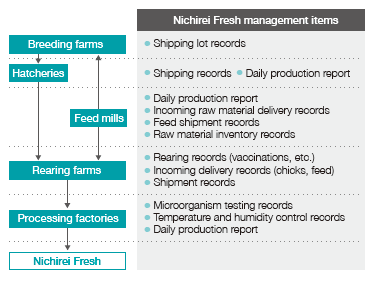
| FY2020 | FY2021 | FY2022 | FY2023 | FY2024 | |
|---|---|---|---|---|---|
| Nichirei Foods | Initiatives utilizing Sedex *See the next section. | ||||
| Started creating Supplier CSR Guidelines | Conducted a questionnaire based on CSR guidelines to domestic suppliers | Collected the questionnaire |
・Establishment of the Nichirei Group Supplier Code of Conduct and Supplier Guidelines ・Conducted our Supplier ESG Survey ・89% of most important domestic suppliers support the Nichirei Group Supplier Code of Conduct and Supplier Guidelines |
・99% of most important domestic suppliers support the Nichirei Group Supplier Code of Conduct and Supplier Guidelines | |
| Nichirei Fresh | Analysis of a collected quastionnaire | Developed a new list of suppliers in Japan and overseas | Developed a CSR questionnaire | ||
| Nichirei Logistics Group | - | - | - | ||
| Nichirei Biosciences | - | - | - | ||
In April 2022, we established the Nichirei Group Supplier Code of Conduct and Supplier Guidelines. In FY2023, we asked suppliers in Japan to support the Supplier Code of Conduct and Supplier Guidelines. We also conducted our Supplier ESG Survey, asking for responses to a self-assessment questionnaire.
We received responses to the survey from 89% of our suppliers, all suppliers who responded supported the Supplier Code of Conduct and Supplier Guidelines. We are following up with the remaining 11% to obtain their responses to the survey. Based on the results of the survey, we communicated with several suppliers that gave us cause for concern about possible negative ESG impacts and confirmed that those concerns were not an issue.
We will expand the scope of future surveys to include overseas suppliers while deepening communication with suppliers in ways such as holding briefings to enhance their understanding of our sustainable procurement initiatives and Supplier Code of Conduct and Supplier Guidelines.
●FY2023 Supplier ESG Survey
| Scope | Domestic suppliers of Nichirei Foods, Nichirei Fresh, Nichirei Logistics Group, and Nichirei Biosciences. We select companies for the survey based on transaction importance, encompassing factors including transaction volume. The survey covers companies that account for about approximately 50% of transactions on a monetary basis. |
|---|---|
| Content | The survey requests compliance with the Supplier Code of Conduct and Supplier Guidelines and is evaluated based on responses to a self-assessment questionnaire. |
| Question Design | Questions are designed to confirm the status of each supplier’s initiatives to align with the Supplier Code of Conduct and Supplier Guidelines, and cover legal compliance and ethical behavior, human rights and labor, safety and health, environment, management, and corporate governance related to sustainability. We created the survey with reference to CSR/Sustainable Procurement Self-assessment Tool Set (1st Edition) created by Global Compact Network Japan. |
| Response Rate | 89% (Support rate was also 89%) |
Nichirei Foods joined Sedex, who provides a platform which is designed to manage and share corporate ethical information including social, human rights, and enviormental topics with the aim of realizing responsible business practices in supply chains, in July 2019. In October 2020, we established "Nichirei Foods Supplier CSR Guidelines", disseminated in five languages. Preparation for the audits began in FY2021, and in FY2022, we received SMETA audit* at 15 our own plants in Japan. In addition to our own plants, two major OEM suppliers also received SMETA audit. We are continuously working with the sustainability platform Sedex.

| July 2019 | Nichirei Foods joins the Supplier Ethical Data Exchange (Sedex) as a Buyer/Supplier (AB) member |
|---|---|
| May 2021–February 2022 | We conducted a SMETA audit for all 15 of the factories we own and operate in Japan (using the four pillars of Labor Standards, Health and Safety, Environment, and Business Ethics) |
| December 2022 | Ten food and beverage companies, including Nichirei Foods, have formed the Buyer Members Sedex Working Team for the Japanese Food & Beverage Industry to promote shared use and standardization of Sedex within the food and beverage industry. https://www.nichireifoods.co.jp/news/2022/info_id14398 (Japanese only) January–February 2023: Conducted Sedex joint online briefing for supplier companies July 2023: Conducted an online briefing for companies involved in trading |
| February–March 2023 | Nichirei Foods held four online briefing sessions to promote the use of Sedex among suppliers |
| October 2023–February 2024 | Nichirei Food’s Procurement Department held procurement policy briefings for suppliers at four locations in Japan to explain joint decarbonization and human rights initiatives, and promote the use of Sedex |
In FY2023, we launched human rights due diligence initiatives with agricultural, meat, poultry and marine product suppliers, which account for the largest proportion of procurement volume in the Nichirei Group’s business activities. We determine priorities based on importance of transactions and human rights risk by country and industry. When conducting human rights impact assessments and human rights audits, we confirm with our suppliers that the goal is to address issues related to human rights, labor, and health and safety, while building long-term, mutually positive relationships.
●Human Rights Due Diligence Result and Plan for FY2023–2025
| FY2023 Result | FY2024 Result | FY2025 Plan | |
|---|---|---|---|
| Scope | Meat and poultry suppliers (Domestic chicken) | Meat and poultry suppliers (Domestic) Marine products suppliers (Overseas) |
Meat and poultry suppliers (Domestic) Marine products suppliers (Domestic) Agricultural Products suppliers (Overseas) |
●Nichirei Group identifies Human Rights Violation Risks
We use the human rights risk database of Verisk Maplecroft to identify human rights violation risks that the Group should be aware of, and prioritize our responses.
| Main human rights violation risks | Main countries of production and raw material procurement | ||
|---|---|---|---|
| Japan | Factories (Raw material in general) |
|
― |
| Logistics industry |
|
― | |
| Overseas | Agricultural products |
|
China, United States, Thailand, Brazil, Ecuador, and Vietnam |
| Meat and poultry products | Thailand, Mexico, Brazil, Spain, China, Australia, United States, and Canada | ||
| Marine products | Indonesia, United States, China, Russia, Mauritania, Morocco, Vietnam, Thailand, Canada, and Norway | ||
In September and October 2023, a third party conducted human rights impact assessments at three of Nichirei Fresh’s shrimp suppliers (two in Indonesia and one in Vietnam), accompanied by Nichirei Group employees. While no serious human rights violations, such as forced labor or child labor, were identified, some macro-level risks were identified. We held follow-up dialogues with the two Indonesian suppliers in April 2024 to address the issues related to human rights, labor, and health and safety. Through these dialogues, we confirmed that some of the issues had already been resolved. For more challenging, longer-term issues, the parties discussed possible countermeasures while acknowledging the risks involved.
●Human Rights Impact Assessment Activities in Indonesia
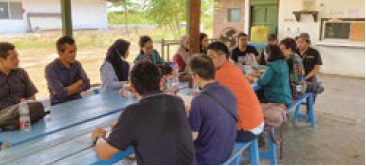 Management interview at a shrimp farm
Management interview at a shrimp farm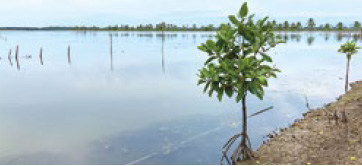 Pond for extensive shrimp farming
Pond for extensive shrimp farming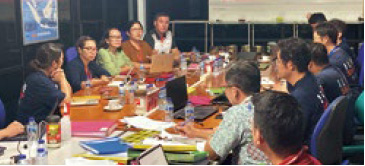 Closing meeting
Closing meetingWe recognize the importance of sharing information and raising awareness with our suppliers in order to build constructive relationships with them and improve corporate value for both parties. For this reason, Nichirei Foods and Nichirei Fresh have been holding "Nichirei Foods Procurement Policy Briefings" and "Nichirei Fresh Supplier Briefings" for major suppliers since FY2023 to share our environmental and social policies and to raise awareness of environmental issues and so on.
Nichirei do Brasil Agricola Ltda. provides contractors with acerola seedlings and cultivation technology, and the fruits that are the result are all purchased by Nichirei do Brasil Agricola, and contributes to the local society including the guidance for the farmers, employment and income.
We are inviting experts to participate in study sessions on sustainability for management.
●Online study session
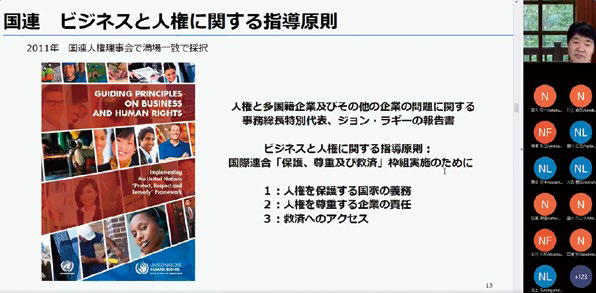
●FY2023
| Date | Theme | Lecturers | Number of participants (number of directors in parentheses) |
Percentage of directors attending |
|
|---|---|---|---|---|---|
| 1st | April 26, 2022 | Sustainability Challenges Faced by Corporations | Kenji Fuma, CEO, Neural Inc. | 124 participants (6) | 60% |
| 2nd | May 24, 2022 | The Future of Food and Transportation | Kenji Fuma, CEO, Neural Inc. | 127 participants (7) | 70% |
| 3rd | June 28, 2022 | Sustainable Procurement and Human Rights Issues | Hidemi Tomita, President, LRQA Sustainability Co. | 139 participants (8) | 80% |
| 4th | August 23, 2022 | The Importance of SDGs and the Significance of Corporate Initiatives | Kazuo Tase, CEO, SDG Partners, Inc. | 131 participants (9) | 90% |
| 5th | September 27, 2022 | Business Transformation to Circular Economy | Shinichi Tabei, AMITA HOLDINGS CO., LTD. | 140 participants (10) | 100% |
| 6th | January 24, 2023 | "Human Rights" tackled in the supply chain - What is the human rights due diligence expected of companies nowadays - | Hiroshi Ishida, Executive Director, Caux Round Table Japan | 154 participants (10) | 100% |
●FY2024
| Date | Theme | Lecturers | Number of participants (number of directors in parentheses) |
Percentage of directors attending | |
|---|---|---|---|---|---|
| 1st | April 25, 2023 | The Truth about Global Warming | Seita Emori, Professor Institute for Future Initiatives, The University of Tokyo Senior Principal Researcher, Earth System Division, NIES |
165 participants (9) | 90% |
| 2nd | May 30, 2023 | Biodiversity and Resource Depletion | Naoki Adachi, CEO Response Ability, Inc. |
175 participants (10) | 100% |
| 3rd | July 4, 2023 | DE&I from LGBTQ perspectives - Changing the workplace and a society by LGBTQ perspectives - | Maki Muraki, Director NPO Nijiiro Diversity |
173 participants (10) | 100% |
●FY2025
| Date | Theme | Lecturers | Number of participants (number of directors in parentheses) |
Percentage of directors attending | |
|---|---|---|---|---|---|
| 1st | July 2, 2024 | Current Trends in Corporate Sustainability Management | Yukari Takamura, Professor Institute for Future Initiatives, The University of Tokyo |
194 participants (11) | 100% |
| 2nd | September 10, 2024 | Financial and Non-financial Connectivity and Social Impact | Ken Shibusawa, President Shibusawa and Company,Inc. |
210 participants (10) | 92% |
●FY2024
As part of our supply chain management to achieve sustainable procurement, we conducted training courses on sustainable procurement for procurement staff.
The training began with a lecture on the Nichirei Group Sustainable Procurement Policy and other procurement-related policies.
To deepen the knowledge of those in charge of procurement so that they can make use of it in their daily work, we invited knowledgeable persons to give lectures, and conducted workshops specializing in each field.
| Date | Category | Common theme | Lecturer | Category Theme | Lecturers | Participants | |
|---|---|---|---|---|---|---|---|
| 1st | Nov. 28, 2023 | Marine products | Why we are requested sustainable procurements | Hidemi Tomita, President, LRQA Sustainability Co. | Sustainable procurement on marine products | Seafood Legacy Co., Ltd., CEO, Wakao Hanaoka | 34 |
| 2nd | Nov. 29, 2023 | Meat and Poultry products | Current situation and future about animal welfare | Tokyo University of Agriculture and Technology, Professor, Tsuyoshi Shimmura | 34 | ||
| 3rd | Apr. 18, 2024 | Agricultural products | What is sustainable procurement with agricultural products? | WWF Japan, Akiko Minami Akihiko Haga Takashi Namiki Mei Haneo |
26 |
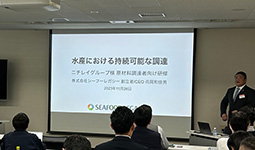 Lecture
Lecture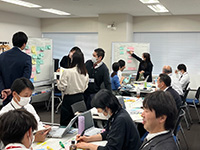 Active discussions during the workshop
Active discussions during the workshop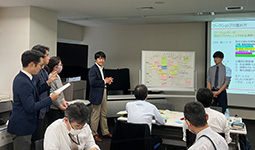 Workshop Presentations
Workshop Presentations●FY2023
| Implementation period | Theme | Implementation rate | |
|---|---|---|---|
| 1 | May 9 - May 27, 2022 | Circular Economy | 97.1% |
| 2 | Nov 14 - Dec 12, 2022 | SDGs in general | 93.8% |
| 3 | Dec 1 - 28, 2022 | Business and Human Rights | 93.9% |
●FY2024
| Implementation period | Theme | Implementation rate | |
|---|---|---|---|
| 1 | Jun 7-27, 2023 | Environment (CO₂ Emissions Reduction) | 93.8% |
| 2 | Jul 5-26, 2023 | Environment (Global Warming) | 93.1% |
| 3 | Sep 4-25, 2023 | SDGs Overview | 93.2% |
| 4 | Dec 4-22, 2023 | Business and Human Rights | 94.2% |
●FY2025
| Implementation period | Theme | Implementation rate | |
|---|---|---|---|
| 1 | Jun 3-21, 2024 | Environment (Circular Economy) | 95.7% |
| 2 | Sep 2-24, 2024 | SDGs Overview | 94.8% |
| 3 | Dec 2-20, 2024 | Business and Human Rights | 93.5% |